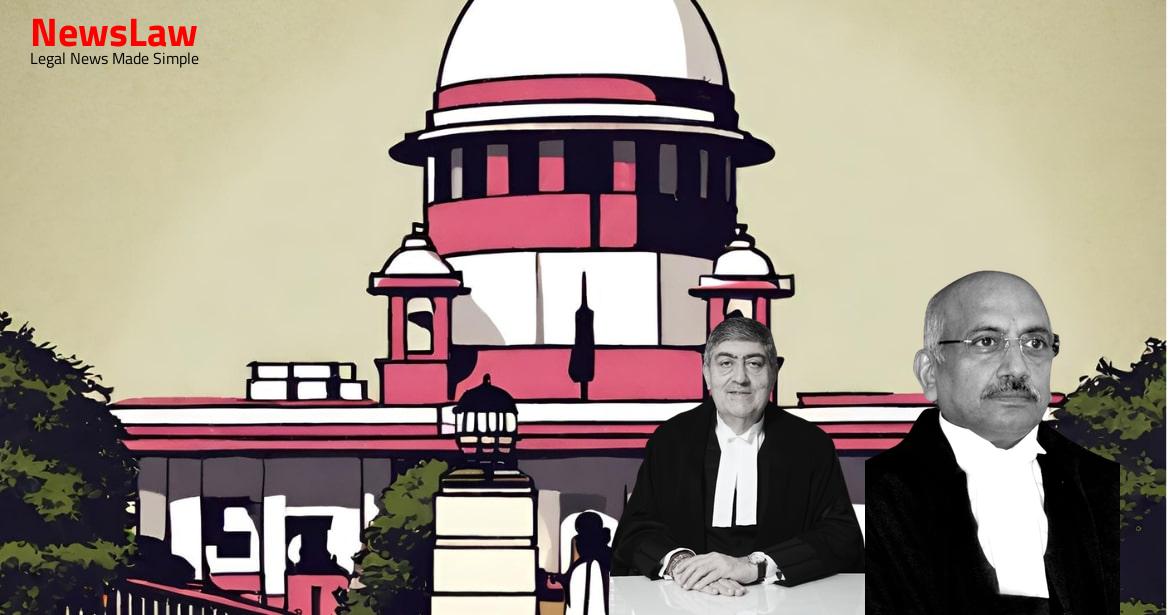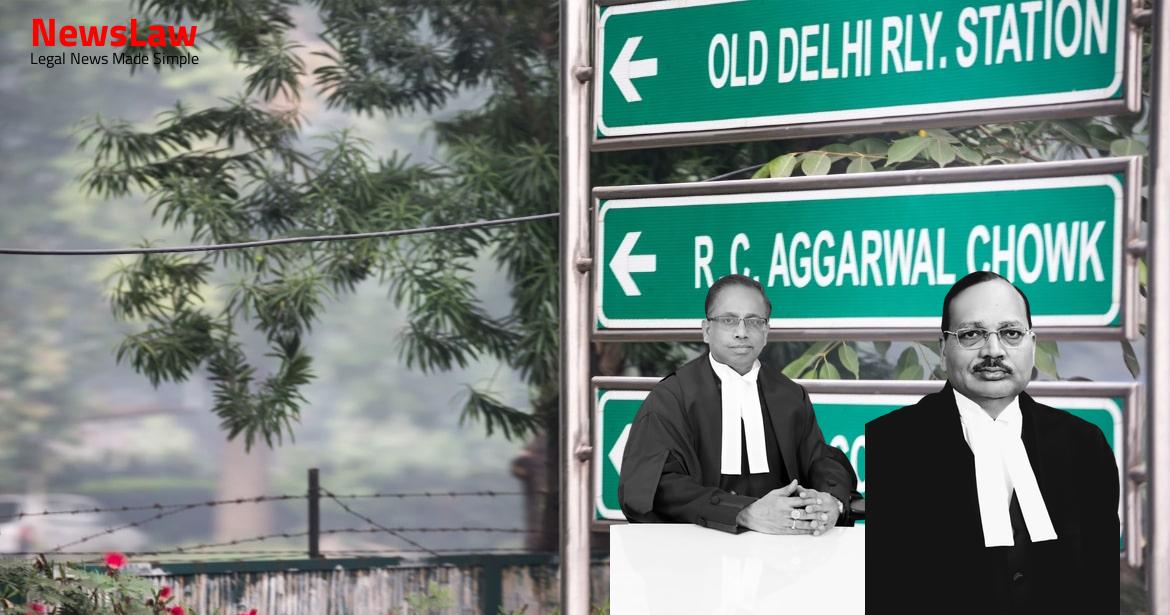A recent legal case involving administrative suspension delves into the interpretation of ‘competent authority’ under the relevant statute. The court’s analysis highlights the importance of harmonizing conflicting provisions within the law to uphold legislative intent. The case sheds light on the application of statutory provisions to ensure workability and effectiveness, avoiding absurd outcomes. Follow the blog to explore the intricate legal reasoning behind this significant judgment.
Facts
- Section 39A of the MMC Act allowed for the creation of one or more posts of AMCs and the appointment of suitable persons to these posts.
- On November 11, 2011, a Government Resolution (G.R.) was issued by the State Government, coinciding with the arrest of respondent No.1, who was in custody from the same date until June 17, 2018.
- The Commissioner of the KDM Corporation, on June 18, 2018, suspended respondent No.1 from service citing Section 56(1)(b) of the MMC Act and Rule 4(1) of the Maharashtra Civil Services (Discipline and Appeal) Rules, 1979.
- The Selection Committee recommended respondent No.1 as the most suitable candidate for the post of AMC of the KDM Corporation in a meeting held on May 5, 2015.
- Respondent No.1 was appointed as AMC of the KDM Corporation by the State of Maharashtra on June 2, 2015.
- The respondent filed a writ petition seeking to withdraw/cancel the suspension order, General Body Resolution, and Notice of Departmental inquiry, as well as reinstatement to the post of AMC of the KDM Corporation.
- The High Court allowed the writ petition on April 6, 2021, granting the reliefs requested by respondent No.1.
- The KDM Corporation and the State of Maharashtra have appealed against this decision.
- The High Court quashed the departmental inquiry initiated against respondent No.1 and directed the KDM Corporation to reinstate him as the Additional Municipal Commissioner.
- The Division Bench of the High Court held that the KDM Corporation was not the competent authority to suspend respondent No.1, Sanjay Gajanan Gharat.
- The suspension order issued by the Commissioner and ratified by the KDM Corporation, as well as the departmental inquiry initiated by the Commissioner with the approval of KDM Corporation, were deemed beyond their powers.
Also Read: Presumption of Genuine Endorsements in Cheque Case
Arguments
- Argument by petitioner that specific provisions in MMC Act empower Commissioner to suspend employee and initiate departmental proceedings
- Petitioner’s contention that High Court judgment would allow respondent No.1 to escape consequences despite being caught red-handed in trap case
- Petitioner’s reference to Section 16 of Maharashtra General Clauses Act and lack of consideration by High Court
- Petitioner’s assertion that respondent No.1’s arrest and detention for over 48 hours led to deemed suspension under MCS Rules
- The respondent No.1 was appointed by the State Government under Section 39A of the MMC Act as an Assistant Municipal Commissioner (AMC).
- The AMC position is considered to be equivalent to that of the Commissioner, who is appointed under Section 36 of the MMC Act.
- Under Section 39A(2) of the MMC Act, an AMC is subject to the same liabilities, restrictions, and terms and conditions of service as the Commissioner.
- The posts of the Commissioner and the AMC are found in Chapter II of the MMC Act, whereas Section 56, which allows suspension, is in Chapter IV of the Act.
- The term ‘competent authority’ should be interpreted as only those authorities competent to make appointments to posts in Chapter IV of the MMC Act.
- Citing the judgment in the case of Ajay Kumar Choudhary v. Union of India, the continued suspension of the respondent No.1 was deemed unwarranted.
Also Read: Medical Negligence and Compensation: A Landmark Decision
Analysis
- The legislative intent behind the creation of the post of Additional Municipal Commissioner (AMC) was to be filled by officers either from the respective Corporation or State Government cadre.
- The interpretation of ‘competent authority’ must be in line with the workability of the statute.
- The High Court’s decision to set aside the suspension and departmental proceedings against respondent No.1 was erroneous.
- The powers of AMC are subject to the control of the Commissioner, and thus the Commissioner is the competent authority for the post of AMC.
- The finding that the Commissioner or Corporation cannot take action against the AMC is incorrect based on relevant provisions of the MMC Act.
- Interpretation of statutory provisions should avoid absurdity and maintain the purpose and workability of the legislation.
- Inconsistencies between different sections of the MMC Act must be harmonized to give effect to the intention of the legislature.
- The legislature could not have intended a situation where no departmental action can be taken against an AMC appointed by the State Government.
- The State Government’s role in appointing AMCs and the Commissioner’s authority over such appointments must be upheld.
- Suspension of municipal officer or servant can be imposed by the Commissioner pending an order of the Corporation.
- The suspension of an officer or servant, if not confirmed by the Corporation within six months, shall come to an end.
- No municipal officer or servant equivalent to or higher in rank than Assistant Commissioner can be dismissed by the Commissioner without the previous approval of the Corporation.
- A competent authority can impose penalties on a municipal officer or servant for various misconducts as specified in the MMC Act.
- Appointment of Additional Municipal Commissioners can exercise powers and perform duties subject to the control of the Commissioner.
- The power of dismissal for officers equivalent to or higher in rank than Assistant Commissioner can only be done by the Commissioner with the previous approval of the Corporation.
- Courts should avoid interpretations that reduce a statute to futility or render provisions useless.
- Interpretations must harmonize conflicting provisions of the Act.
- The intention of the legislature should be sought by interpreting the statute as a whole.
- Efforts should be made to avoid inconsistency or repugnancy between different sections of the Act.
- The statute should be read in its entirety, and provisions should be construed to make a consistent enactment.
- Avoid literal interpretation that leads to absurd or unjust results.
- Courts must strive for a construction that gives effect to all provisions and avoids reducing any provision to a ‘dead letter’.
- Consideration should be given to the legislative intent while interpreting statutes.
- The principle of harmonious construction should be applied to reconcile conflicting provisions and give effect to the intention of the legislature.
- The statute should be viewed as a workable instrument, and interpretations should aim to make it operational.
- The impugned judgment passed by the High Court was deemed unsustainable in law.
- Respondent No.1 cannot benefit from his own refusal to participate in departmental proceedings.
- Allegations against respondent No.1 are serious.
- The respondent in the case was suspended for over six years, which was considered unjustifiable.
- Continuation of respondent No.1 under suspension for a prolonged period was questioned.
- No useful purpose was seen in continuing the suspension of respondent No.1.
- Respondent No.1 chose not to participate in departmental proceedings despite calls to do so.
- Directing completion of departmental proceedings within a stipulated period was suggested to address prolonged suspension.
Also Read: Remand of Writ Petition for Restoration and Decision on Merits
Decision
- The impugned judgment dated 6 April 2021 by the High Court of Judicature at Bombay in Writ Petition No. 3599 of 2020 is quashed and set aside.
- Writ Petition No. 3599 of 2020 filed by respondent No.1 before the High Court of Judicature at Bombay is dismissed.
- Respondent No.1 remains under suspension until the conclusion of departmental proceedings.
- Pending application(s) to be disposed of accordingly.
- No costs ordered.
- Departmental proceedings against respondent No.1 to be completed expeditiously within four months from the date of this judgment.
Case Title: KALYAN DOMBIVALI MUNICIPAL CORPORATION Vs. SANJAY GAJANAN GHARAT (2022 INSC 377)
Case Number: C.A. No.-002643-002643 / 2022



